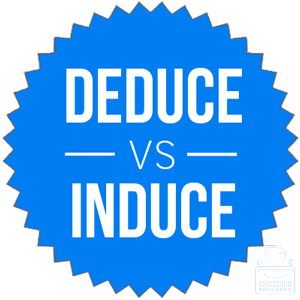When you look at available evidence and reach a conclusion, are you deducing something, or inducing something?
The answer is a bit complicated. Depending on the types of evidence you found and the types of reasoning you used to make your decision, either word could be appropriate.
Let’s examine each word in a bit more detail.
What is the Difference Between Deduce and Induce?
In this post, I will compare deduce vs. induce. I will use each word in at least one example sentence, so you can see how it should appear in context.
Plus, I will show you a helpful memory tool that makes choosing either deduce or induce much easier.
When to Use Deduce
 What does deduce mean? Deduce is a verb. It means to arrive at a conclusion through logic and reasoning. Its corresponding noun is deduction.
What does deduce mean? Deduce is a verb. It means to arrive at a conclusion through logic and reasoning. Its corresponding noun is deduction.
Someone who deduces something takes pieces of available evidence and uses them to arrive at a conclusion. If you saw an empty candy wrapper in your friend’s trash, you could deduce that he or she had eaten candy recently. If you saw a receipt for expensive jewelry in the trash, you could deduce that he or she had purchased some jewelry recently.
For example,
- From the cigarette butt still burning in the ashtray and the lukewarm coffee in the pot, the detective deduced that the suspect had only recently left his apartment.
- Philosophers use formal logic to deduce profound truths about the nature of knowledge, truth, and even of existence itself.
The fictional character Sherlock Holmes is famous for his power of deduction.
When to Use Induce
 What does induce mean? Induce is also a verb. It means to cause or influence something or to infer.
What does induce mean? Induce is also a verb. It means to cause or influence something or to infer.
Here is an example of the first sense,
- The doctor was out of the proper medicine, so she induced vomiting by inserting her fingers down the patient’s throat.
When induce refers to a style of reasoning, it means to infer, or to arrive at a conclusion through a process of induction.
To grossly oversimplify, deductive reasoning takes broad, general truths and uses them to arrive at concrete, specific conclusions. Here is an example of a deductive syllogism:
- All cats shed.
Rufus is a cat.
Therefore, Rufus sheds.
The argument takes categorical truths about cats and a being called Rufus and uses them to draw a specific conclusion, namely, that Rufus sheds.
Inductive reasoning, meanwhile, examines concrete observations and draws broad, general conclusions.
Here is an example of inductive reasoning,
- We found thirty American pennies, and they were all made of copper.
We found no American pennies that were not made from copper.
Therefore, all American pennies must be made from copper.
Deduction and induction are both valid forms of reasoning, and both deduce and induce are verbs that describe types of logic.
Trick to Remember the Difference
 Induce and deduce describe deductive and inductive reasoning, respectively.
Induce and deduce describe deductive and inductive reasoning, respectively.
Induce vs. Deduce Check: Since deduction distills broad, categorical observations into specific, concrete conclusions, and deduction and distill each begin with the letter D, it should be easy to remember what this verb means.
Summary
Is it induce or deduce? Deduce and induce are verbs that refer to different methods of reasoning and using logic. They are both legitimate verbs, but they refer to different concepts and are not usually interchangeable.
Contents
